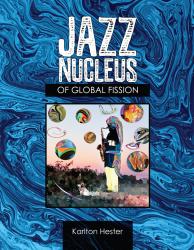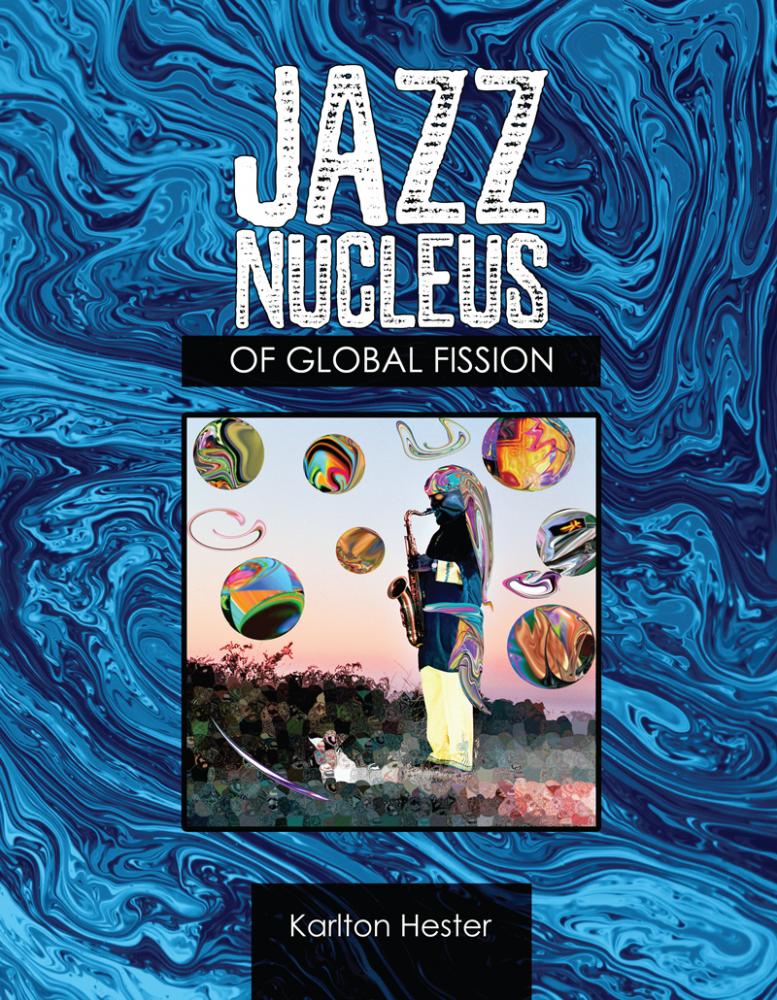Jazz Nucleus of Global Fission
Author(s): Karlton Hester
Edition: 1
Copyright: 2019
Exploring the evolution Homo sapien culture through examining the progression of "jazz" from its African roots. The course delineates and parallels the historical migrations of humankind, from its African source, through the lens of musical instruments, iconography, cultural and ritual patterns, kinetic expression, and shared musical elements. Online resources provide access links to historical to recordings, video documents, and other audio and visual resources that supplement our course reading, lecture discussions, & potential live class performance and listening adventures.
Chapter 1 Overview of Global Origins and Connections
Chapter 2 Ritual, Transcendence, and Spiritual Freedom
Chapter 3 A Holistic Approach to Global Musical Investigation
Chapter 4 End of Twentieth-Century Musical Perspectives
Chapter 5 Music as International Expressive Language
Chapter 6 Concept of Freedom within Emerging Shapes of Creativity in the Twenty-First Century
Chapter 7 Search for Balance, Sustainability, Consciousness, and Freedom
Chapter 8 Music as a Microcosm of Vibrational Consciousness
Karlton Hester earned his B.M. at University of Texas at El Paso, his M.A. in Music Education from San Francisco State University, and his Ph.D. in Composition from the City University of New York Graduate Center.[1] He formally studied flute with Harry Nelsova and Paul Renzi, saxophone with Frank Chase and Bill Tremble, composition with Bruce Saylor and Robert Starer, and improvisation with Joe Henderson and John Handy. He began his career as a studio musician and music educator in Los Angeles and would later serve as the Herbert Gussman Director of Jazz Studies at Cornell University from 1990-2000.[2] At Cornell Hester directed the Traditional and Experimental Lab Ensembles[3] and coordinated university festivals and conferences that included a diverse array of “jazz” and African artists including Jaki Byard, John Handy, Joe Henderson, Cecil Taylor, McCoy Tyner, Toshiko Akiyoshi, Stanley Turrentine, Louis Jordan, Buddy Collette, Dr. Donald Byrd, Dr. Billy Taylor, Randy Weston, Charles Lloyd, Geri Allen, Benny Powell, Charles Tolliver, Steve Turre, Sam Rivers, Thomas Mapfumo, George E. Lewis, Roscoe Mitchell, Hotep Galeta, Victor Goines, Akua Dixon, Mamadou Diabate, Samite Mulondo, Cecilia Smith, Phil Bowler, Adela Dalto, Pamela Wise, and Nick Mathis.[4] As of 2000 Hester directs the "jazz" program at UC Santa Cruz, is a Professor of Music (composition and jazz) in the Music Department, and is Director of the Digital Arts and New Media program at UCSC.
Hester is the founder and director of the San Francisco Fillmore Jazz Preservation Big Band[5] and Hesterian Musicism. Hester’s music involves a synthesis of Afrocentric and Western tonal, modal, quartal, serial, and electronic elements into an expressive voice that defies simple categorization as either premeditated or spontaneous composition.[6] Hester's Ph.D. dissertation is entitled "The Melodic and Polyrhythmic Development of John Coltrane's Spontaneous Compositions in a Racist Society," and the music of John Coltrane has been a lasting influence on his work.[7][8] He coined the term musicism [9] to “represent the creative process by which musicians, visual artists and poets, through the merging of composition and performance, produce new art forms.”[10] This interdisciplinary approach is realized in projects such as “Three Bodies” where Hester collaborated with astrophysicist Greg Laughlin and dancer Ted Warburton to create a multimedia performance that offers a “solution” to the three-body problem.[11] Hester has been the recipient of composer fellowships, grants, and commissions from the National Endowment of the Arts, New York Foundation for the Arts, New England Council of the Arts, ASCAP, and the William Grant Still Foundation.[12] He served as the vice president of the International Society for Improvised Music (2008-2018) and is founding director of Interdisciplinary Artists Aggregation, Inc. (1970–present).[13][14] Hester is a Gold Medal winner of a Global Music Award for Experimental Jazz in December 2017, for his 2016 album Trans-Cultural Musicism.[15]
Exploring the evolution Homo sapien culture through examining the progression of "jazz" from its African roots. The course delineates and parallels the historical migrations of humankind, from its African source, through the lens of musical instruments, iconography, cultural and ritual patterns, kinetic expression, and shared musical elements. Online resources provide access links to historical to recordings, video documents, and other audio and visual resources that supplement our course reading, lecture discussions, & potential live class performance and listening adventures.
Chapter 1 Overview of Global Origins and Connections
Chapter 2 Ritual, Transcendence, and Spiritual Freedom
Chapter 3 A Holistic Approach to Global Musical Investigation
Chapter 4 End of Twentieth-Century Musical Perspectives
Chapter 5 Music as International Expressive Language
Chapter 6 Concept of Freedom within Emerging Shapes of Creativity in the Twenty-First Century
Chapter 7 Search for Balance, Sustainability, Consciousness, and Freedom
Chapter 8 Music as a Microcosm of Vibrational Consciousness
Karlton Hester earned his B.M. at University of Texas at El Paso, his M.A. in Music Education from San Francisco State University, and his Ph.D. in Composition from the City University of New York Graduate Center.[1] He formally studied flute with Harry Nelsova and Paul Renzi, saxophone with Frank Chase and Bill Tremble, composition with Bruce Saylor and Robert Starer, and improvisation with Joe Henderson and John Handy. He began his career as a studio musician and music educator in Los Angeles and would later serve as the Herbert Gussman Director of Jazz Studies at Cornell University from 1990-2000.[2] At Cornell Hester directed the Traditional and Experimental Lab Ensembles[3] and coordinated university festivals and conferences that included a diverse array of “jazz” and African artists including Jaki Byard, John Handy, Joe Henderson, Cecil Taylor, McCoy Tyner, Toshiko Akiyoshi, Stanley Turrentine, Louis Jordan, Buddy Collette, Dr. Donald Byrd, Dr. Billy Taylor, Randy Weston, Charles Lloyd, Geri Allen, Benny Powell, Charles Tolliver, Steve Turre, Sam Rivers, Thomas Mapfumo, George E. Lewis, Roscoe Mitchell, Hotep Galeta, Victor Goines, Akua Dixon, Mamadou Diabate, Samite Mulondo, Cecilia Smith, Phil Bowler, Adela Dalto, Pamela Wise, and Nick Mathis.[4] As of 2000 Hester directs the "jazz" program at UC Santa Cruz, is a Professor of Music (composition and jazz) in the Music Department, and is Director of the Digital Arts and New Media program at UCSC.
Hester is the founder and director of the San Francisco Fillmore Jazz Preservation Big Band[5] and Hesterian Musicism. Hester’s music involves a synthesis of Afrocentric and Western tonal, modal, quartal, serial, and electronic elements into an expressive voice that defies simple categorization as either premeditated or spontaneous composition.[6] Hester's Ph.D. dissertation is entitled "The Melodic and Polyrhythmic Development of John Coltrane's Spontaneous Compositions in a Racist Society," and the music of John Coltrane has been a lasting influence on his work.[7][8] He coined the term musicism [9] to “represent the creative process by which musicians, visual artists and poets, through the merging of composition and performance, produce new art forms.”[10] This interdisciplinary approach is realized in projects such as “Three Bodies” where Hester collaborated with astrophysicist Greg Laughlin and dancer Ted Warburton to create a multimedia performance that offers a “solution” to the three-body problem.[11] Hester has been the recipient of composer fellowships, grants, and commissions from the National Endowment of the Arts, New York Foundation for the Arts, New England Council of the Arts, ASCAP, and the William Grant Still Foundation.[12] He served as the vice president of the International Society for Improvised Music (2008-2018) and is founding director of Interdisciplinary Artists Aggregation, Inc. (1970–present).[13][14] Hester is a Gold Medal winner of a Global Music Award for Experimental Jazz in December 2017, for his 2016 album Trans-Cultural Musicism.[15]

